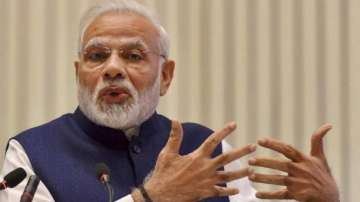PM Modi brainstorms oil scenario with global honchos amid growing outrage over spiralling fuel prices, US sanctions on Iran
The meeting, coordinated by the NITI Aayog, is likely to focus on challenges posed by volatile oil prices and the US sanctions on Iran.

Prime Minister Narendra Modi's meeting with chief executives of major global and Indian oil companies to discuss the emerging energy scenario amid the growing discontent in the nation over the continuous skyrocketing of fuel prices and the US sanctions on Iran which will kick-off from November 4 is currently underway.
The third annual meeting would also deliberate on ways to revive investment in oil and gas exploration and production, official sources said.
PM Modi's first meeting was on January 5, 2016 where suggestions for reforming natural gas prices were made. More than a year later, the government allowed higher natural gas price for yet-to-be-produced fields in difficult areas like deep sea.
During the last edition in October 2017, various suggestions were made for giving out equity to foreign and private companies in producing oil and gas fields of state-owned ONGC and OIL. But the plan could not go through in view of strong opposition from Oil and Natural Gas Corp (ONGC).
Sources said Saudi Oil Minister Khalid A Al Falih, BP CEO Bob Dudley, Total head Patrick Fouyane, Reliance Industries Chairman Mukesh Ambani and Vedanta chief Anil Agarwal are expected to attend the meeting on Monday.
The meeting, coordinated by the NITI Aayog, is likely to focus on challenges posed by volatile oil prices and the US sanctions on Iran.
The meeting would look at measures to attract investments and steps for making it easier to do business in India.
Sources said reforms initiated in the last four years in the oil and gas sector, including open acreage policy, pricing reforms and liberalised licensing policy, will be showcased and suggestions would be sought on what more can be done to hasten growth.
The government is looking at private investment to raise domestic oil and gas production, which has stagnated for the last few years while fuel demand has been rising by 5-6 per cent annually. India is dependent on imports to meet 83 per cent of its demand and more than half of its natural gas requirements.
The Prime Minister in 2015 had set a target of reducing India's oil dependence by 10 per cent to 67 per cent (based on import dependence of 77 per cent in 2014-15) by 2022. Import dependence has only increased since then and the government is now looking for ways to raise domestic output.
Organisation of the Petroleum Exporting Countries (OPEC) Secretary General Mohammed Barkindo and India's Oil Minister Dharmendra Pradhan would also attend the meeting, they said.
ONGC Chairman and Managing Director Shashi Shanker, Indian Oil Corporation (IOC) Chairman Sanjiv Singh, GAIL India head B C Tripathi, Hindustan Petroleum Corp Ltd (HPCL) Chairman Mukesh Kumar Suran, Oil India Chairman Utpal Bora and Bharat Petroleum Corp Ltd (BPCL) Chairman D Rajkumar will also most likely attend the meeting.
The meeting assumes paramount significance as the fuel prices all across the nation continue to spiral despite government's price cut announcement. The central government on October 4 had announced a reduction of Rs 2.50 per litre on both diesel and petrol. Following the suit, several states also announced a price cut in fuel prices.
The fuel prices witnessed a steep hike on Monday. The revised rates of petrol and diesel in Delhi stood at Rs Rs 82.72 per litre and Rs 75.46 per litre respectively. The prices of petrol and diesel in Mumbai stood at Rs 88.18 per litre and Rs 79.11 per litre respectively on Monday.
Earlier on Sunday, petrol prices in Delhi touched Rs 82.72 per litre whereas in Mumbai the rates of petrol stood at Rs 88.18 per litre. Diesel rates also witnessed hike in Delhi and Mumbai. The revised rates of diesel in Delhi and Mumbai stood a Rs 75.38 per litre and Rs 79.02 per litre respectively.
India will also be worrisome regarding the US sanctions on Iran's crude oil exports. The government is under immense pressure with Washington ratcheting up the pressure on governments and companies around the world to slash their Iranian oil imports to zero.
However, Oil Minister Pradhan said India would continue to purchase Iranian crude in November. Pradhan also added the country was considering evolving a different payment system to buy Iran's oil and that it could pay using Indian rupees. This would signal an attempt to bypass US sanctions on Iranian transactions using the dollar — the dominant currency in global oil trade.
Meanwhile, US on Friday said that India's decision to continue buying oil from Iran after November 4 was not helpful.